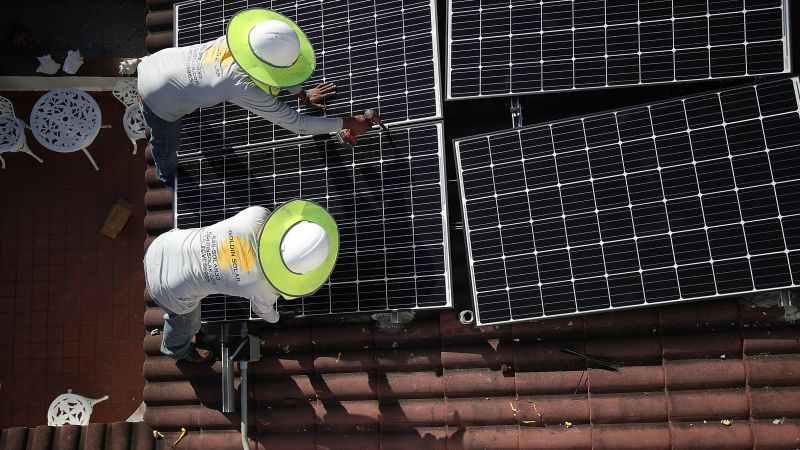- Joined
- Jan 25, 2012
- Messages
- 44,615
- Reaction score
- 14,470
- Location
- Texas
- Gender
- Male
- Political Leaning
- Conservative
I am guessing that you do not understand what is at risk with one for one net metering!US Power Grid Operators Warn Renewable Energy Could Cause Blackouts
The OP claims it's renewables that are "the big bad thing" that's going to make electric supplies wink out this summer.
I say it's greedy corporate owned utilities that don't see a reason to build more capacity and running to the government for bailouts, which has been the standard business model
ever since Reagan-style deregulation became the norm.
Also, let's think about the states that are actively trying to PUNISH people who want to install residential solar power.

Could Florida turn off the sun? Advocates say a utility-backed bill imperils rooftop solar in the Sunshine State | CNN Politics
Steve Rutherford had a unique mission as a Navy SEAL: Help the military harness the power of the sun.www.cnn.com
In 2021, a national network of utility interest groups and fossil fuel-linked think tanks continues to offer funding, advice and support to utilities across the country seeking to undermine rooftop solar power. These include:
- Edison Electric Institute. Edison Electric Institute (EEI), the trade group that represents U.S. investor-owned electric utilities, developed the model for utilities to use in attacking solar at the state level. EEI worked with the American Legislative Exchange Council to create model legislation to attack net metering. EEI has trained utility executives in how to run advocacy campaigns and has consistently been a major donor to national Congressional candidates and parties.
- Consumer Energy Alliance. The Consumer Energy Alliance (CEA) is a Houston-based front group for the utility and fossil fuel industry, representing companies like Florida Power & Light, ExxonMobil, Chevron and Shell Oil CEA has spent resources or shipped representatives across the country to help utilities fight their battles in states like Florida, Indiana and Utah.
- The American Legislative Exchange Council (ALEC). ALEC is a nationwide organization funded in part by anti-solar interests including major utilities, fossil fuel companies and affiliated lobby groups. ALEC claims to be primarily a membership organization but is dominated by its corporate and other outside donors, who provide 98% of its budget. It has worked for years to fight renewable energy and pro-solar policies across the country by coordinating with utilities and other local special interests and introducing legislation through policymakers who are ALEC members.
- Koch Industries. The Koch organization has provided funding to the national fight against solar by funneling tens of millions of dollars through a network of opaque nonprofits. The Koch-funded campaign organization Americans for Prosperity (AFP) has carried out extensive anti-solar organizing efforts. Koch organizations have directly supported utility fights against solar power in a number of states.
We're flying electric helicopters on Mars yet you can't turn on your clothes dryer in Texas. That's because scientists are in charge of Mars, and Republicans are in charge of Texas.
If one to one net metering is forced on the utilities, they will be forced into bankruptcy.
Before that happens, they will petition the court for relief, and win, because gross profits are
required for a business to continue to offer a service.
The likely remedy is that only grid assist home solar will be allowed to attach to the grid's private property.
A better solution, is to come up with a national grid connection standard that both solar homeowners and grid operators can live with.


/cloudfront-us-east-2.images.arcpublishing.com/reuters/VJVQNOAHNBO6ZGV7BZJ2DWHRP4.jpg)